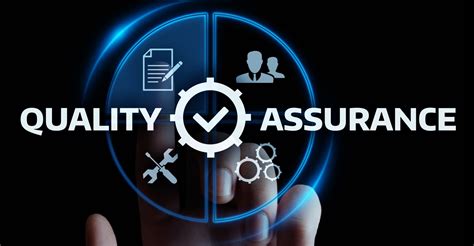Unleash Your Potential in the Thriving Software QA Industry

In the rapidly evolving world of software development, the role of Software Quality Assurance (QA) professionals has become indispensable. With increasing demand for high-quality, reliable software applications, the QA industry is experiencing a surge in job opportunities.
Industry Trends and Job Outlook
According to Glassdoor, the average annual salary for Software QA Analysts in the United States is $112,625, with top earners exceeding $150,000. As the demand for skilled QA professionals continues to outpace supply, the job outlook remains highly favorable.
Job Responsibilities in Software QA
Software QA professionals play a crucial role in ensuring the quality, reliability, and performance of software applications. Their responsibilities typically include:
- Test Planning and Execution: Developing test plans, designing test cases, and executing tests to identify potential bugs and defects.
- Defect Management: Identifying, documenting, and tracking defects throughout the development lifecycle.
- Test Automation: Developing and implementing automated testing tools and frameworks to increase efficiency and reduce testing time.
- Quality Assurance Audits: Conducting audits and reviews of software development processes and deliverables to ensure adherence to standards and best practices.
Types of Software QA Roles
Within the software QA field, there are various specialized roles with distinct responsibilities:
- QA Analyst: Focuses on functional testing, ensuring that the software meets user requirements.
- Test Engineer: Designs and executes complex test cases, often using specialized testing tools.
- Performance Tester: Analyzes software performance and identifies bottlenecks.
- Security Tester: Conducts penetration testing and security assessments to ensure the software is secure from vulnerabilities.
- Automation Tester: Develops and maintains automated testing frameworks and scripts.
Skills Required for Software QA Jobs
To excel in software QA, the following skills are essential:
- Technical Skills: Proficiency in programming languages, testing tools, and test methodologies.
- Analytical Skills: Ability to analyze data, identify patterns, and troubleshoot issues.
- Communication Skills: Excellent written and verbal communication skills to effectively collaborate with stakeholders.
- Problem-Solving Skills: Ability to think critically, identify problems, and develop solutions.
- Attention to Detail: Meticulous and detail-oriented approach to ensure software quality.
Benefits of a Software QA Career
Pursuing a career in software QA offers numerous benefits:
- High Demand: The industry is experiencing high demand for skilled professionals, ensuring job security.
- Competitive Salaries: Software QA professionals are well-compensated for their expertise.
- Job Stability: The role of QA is essential in any software development process, providing job stability.
- Continuous Learning: The field of software QA is constantly evolving, requiring professionals to continuously learn and stay up-to-date with the latest technologies.
- Personal Satisfaction: Making a significant contribution to the quality and safety of software used by businesses and individuals worldwide.
How to Get Started in Software QA
To start a successful career in software QA, consider the following steps:
- Earn a Bachelor’s Degree: While not a requirement, a bachelor’s degree in computer science or a related field provides a solid foundation.
- Acquire Industry Certifications: Certifications such as ISTQB, CSTE, and CASQ demonstrate your expertise and commitment to the field.
- Gain Practical Experience: Participate in internships or contribute to open-source projects to gain hands-on experience.
- Network: Attend industry events, join professional organizations, and connect with professionals in the field.
- Stay Updated with Technology: Keep pace with the latest testing tools, methodologies, and best practices.
Key Considerations
- Soft Skills: While technical skills are crucial, soft skills such as communication, teamwork, and problem-solving are equally important for success.
- Specialization: Consider specializing in a particular area of QA, such as performance testing or security testing, to enhance your marketability.
- Continuous Professional Development: Make a commitment to ongoing learning and development to stay at the forefront of the industry.
Conclusion
The software QA industry offers a rewarding and challenging career path for individuals passionate about ensuring the quality and reliability of software applications. With a strong technical foundation, analytical skills, and a commitment to continuous learning, you can unlock your potential and make a significant contribution to the world of technology. Embrace the opportunities in software QA and embark on a journey of professional growth and personal satisfaction.
Tables
Table 1: Software QA Job Titles and Responsibilities
| Job Title | Responsibilities |
|---|---|
| QA Analyst | Functional testing, user requirements verification |
| Test Engineer | Complex test case design and execution |
| Performance Tester | Software performance analysis, bottleneck identification |
| Security Tester | Penetration testing, security assessment |
| Automation Tester | Automated testing frameworks development and maintenance |
Table 2: Benefits of Software QA Careers
| Benefit | Description |
|---|---|
| High Demand | Strong job market with numerous opportunities |
| Competitive Salaries | Well-compensated for expertise |
| Job Stability | Essential role in software development |
| Continuous Learning | Requires continuous skill development |
| Personal Satisfaction | Impactful contribution to software quality |
Table 3: Steps to Get Started in Software QA
| Step | Action |
|---|---|
| Education | Bachelor’s degree in computer science or related field |
| Certification | Obtain industry certifications (ISTQB, CSTE, CASQ) |
| Experience | Internships, open-source projects |
| Networking | Attend events, join professional organizations |
| Technology | Stay updated with latest tools and methodologies |
Table 4: Skills Required for Software QA Professionals
| Skill | Description |
|---|---|
| Technical Skills | Programming languages, testing tools, methodologies |
| Analytical Skills | Data analysis, problem identification |
| Communication Skills | Written and verbal communication proficiency |
| Problem-Solving Skills | Critical thinking, solution development |
| Attention to Detail | Meticulous and detail-oriented approach |
